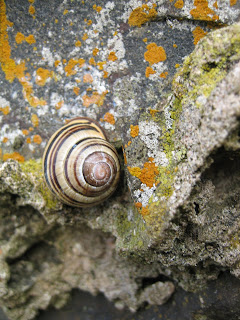 I've been pondering recently the words of administration used in Communion/Eucharist/Lord's Supper services when the elements are served to the communicants. I'm no sacramentologist or liturgical historian and don't really want to get into debates about real presence, however, a little piece of liturgical history might help give some context for those unfamiliar with such debates.
I've been pondering recently the words of administration used in Communion/Eucharist/Lord's Supper services when the elements are served to the communicants. I'm no sacramentologist or liturgical historian and don't really want to get into debates about real presence, however, a little piece of liturgical history might help give some context for those unfamiliar with such debates.
In his 1549 Book of Common Prayer, the first of its kind in English, Anglican Reformer Archbishop Cranmer instructed that these words be used by the minister "when he delivereth the Bread/Cup to anyone":
The body/blood of our Lord Jesus Christ which was given/shed for thee, preserve thy body and soul unto everlasting life.
These words are often read as referring to the identity of the elements so that (in some "physical" sense) the bread
is Christ's body and the wine
is his blood. However, notice that Cranmer's words are ambiguous. Taking the form of a prayer, they simply petition God for the preservation of the communicant's salvation (notice too the good resurrection theology implied in
body and soul) through the broken body and shed blood of Christ. Nothing is said
explicitly here about the status of the elements, leaving open a variety of different understandings about the relationship between the bread and wine being consumed and the body and blood which save.
By the 1552 edition of the prayer book, Archbishop Cranmer replaced the words of administration with this formula:
Take and eat this, in remembrance that Christ died for thee, and feed on him in thy heart by faith, with thanksgiving. ... Drink this in remembrance that Christ's blood was shed for thee, and be thankful.
The feeding upon Christ is now explicitly
in thy heart and
by faith. Notice again, however, that nothing is said explicitly about the status of the elements.
Part of Cranmer's genius in both formulations is to shift our attention from the status of the elements to the meaning of the act of eating them. This meaning is tied in with Christ's saving work in his death; to speak of
shed blood and a
broken body make a closer reference to the narrative of Christ's passion than simply mentioning body and blood.
In 1559, after Cranmer's execution, a third English prayer book was approved by Elizabeth I.
The words of administration were simply a combination of 1549 and 1552:
The body of our Lord Jesus Christ which was given for thee, preserve thy body and soul unto everlasting life; and take and eat this, in remembrance that Christ died for thee, and feed on him in thy heart by faith, with thanksgiving. ... The blood of our Lord Jesus Christ which was shed for thee, preserve thy body and soul unto everlasting life; and drink this in remembrance that Christ's blood was shed for thee, and be thankful.
It's quite a mouthful, but it was this form that was picked up and used again in the definitive 1662
Book of Common Prayer, which continued to be the standard until a series of liturgical revisions across the Anglican communion in the twentieth century.
In Scotland, the words of administration were revised a number of time. In 1929, they were pared back to just the 1549 words, then a further revision in 1970 added this instruction:
After the Words of Administration the Communicant shall answer Amen. The Words of Administration may be shortened at the discretion of the Priest. And then in 1982 (the current form still in use), a decisive shift occurred:
The Body/Blood of Christ given/shed for you.
Notice not only the capitals, but more importantly, the grammatical shift from petition to exclamation. No longer is a prayer being offered for the preservation of the communicant's salvation through Christ's passion. Instead, a nominal phrase (without a main verb) is substituted, which has the function of directing attention back to the elements themselves. More or less, these words say "Wow!" or "Look!".
However, having been to a number of communion services here in Scotland, I've noticed in both Scottish Episcopalian (Anglican) and Church of Scotland (Presbyterian) gatherings that even the narrative reference to "giving" and "shedding" are dropped, leaving simply the
Roman Catholic words, which are short and to the point:
The body/blood of Christ.
 The inestimable Michael Jensen, a.k.a. the blogging parson, has just had his first book published. I mentioned that he was working on it back here and here. It's called YOU: An introduction and can be ordered here (or here if you are in the US) for the bargain price of AUS$16.95. You can even download the cover, contents, introduction and first chapter here.
The inestimable Michael Jensen, a.k.a. the blogging parson, has just had his first book published. I mentioned that he was working on it back here and here. It's called YOU: An introduction and can be ordered here (or here if you are in the US) for the bargain price of AUS$16.95. You can even download the cover, contents, introduction and first chapter here.

























